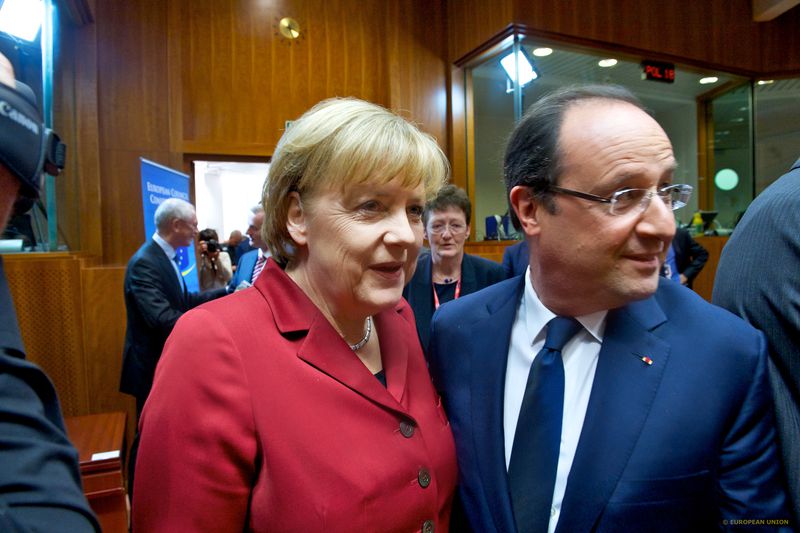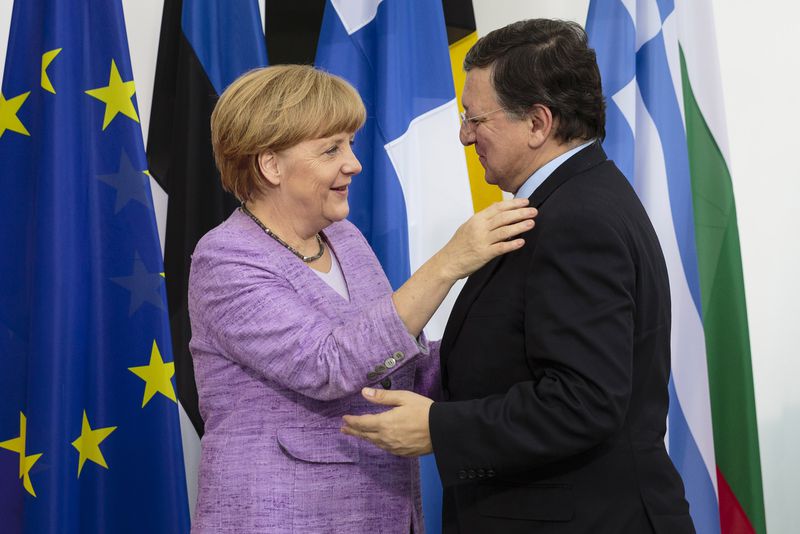Germany, Excuse Us, but We Have To
Adelina Marini, November 18, 2013
 The fourth European Semester will remain in history as the first in which the European Commission dared to treat all member states equally, including the motor of the EU. And if France already is a subject of an in-depth review of its economy for potential problems, which unleashed a war of words between Paris and Brussels, the German economic indicators for the first time will fall under scrutiny by the Commission, for which both Jose Manuel Barroso and Olli Rehn apologised extensively on November 13th. Ever since the European Semester was established through a comprehensive reform of the EU economic governance in the aftermath of the eurozone crisis, journalists constantly asked why Germany did not come under surveillance as a country with excessive current account surplus. But the Commission responded that the external imbalances of Germany were not as threatening to deserve attention. What has changed then since Germany's trade surplus has been above 6% of the GDP since 2007?
The fourth European Semester will remain in history as the first in which the European Commission dared to treat all member states equally, including the motor of the EU. And if France already is a subject of an in-depth review of its economy for potential problems, which unleashed a war of words between Paris and Brussels, the German economic indicators for the first time will fall under scrutiny by the Commission, for which both Jose Manuel Barroso and Olli Rehn apologised extensively on November 13th. Ever since the European Semester was established through a comprehensive reform of the EU economic governance in the aftermath of the eurozone crisis, journalists constantly asked why Germany did not come under surveillance as a country with excessive current account surplus. But the Commission responded that the external imbalances of Germany were not as threatening to deserve attention. What has changed then since Germany's trade surplus has been above 6% of the GDP since 2007?
Germany is the cure for the eurozone's problems
Jose Manuel Barroso's explanation, who is a last "semester" on top of the EU's executive, is that Germany and France have a special responsibility for the recovery of all the other euro area member states, taking into account the size of their economies as compared to the size of the European economy. The data show, Barroso said last Wednesday, that Germany has systemically maintained high current account surpluses, although not all with the European countries. "A high surplus does not necessarily mean that there is an imbalance. But we do need to examine this further and understand whether the high surplus in Germany is something that is affecting the functioning of the European economy as a whole", explained the former prime minster of Portugal, who already announced that he would not stand for a third term as Commission chief.
As if with a guilty conscience and apologising a number of times he added that no one puts into question the German economy's competitiveness, but only that the European powerhouse could do more to help rebalancing the EU economy. Berlin got many apologies for the future in-depth review by Vice President Olli Rehn, too, who is responsible for the EU economic and monetary policy and that of the eurozone in particular. He presented a detailed review of the public debates whether the German trade surplus is a problem for the European economy or not even before the presentation of the formal decision the Commission to launch an in-depth review of the German economy, by indicating what was to come in an article in his blog. "The in-depth review will be done with an open mind and there will be no pre-cooked conclusion, but I am sure that this in-depth review will provide a valuable contribution to the policy debate on economic policy and economic reforms in Germany", Olli Rehn said when presenting the decision.
Alongside the apology for Berlin it is recalled that the country is a growth driver of Europe to a large extent thanks to the European integration. For years Germany has been scoring significant trade surpluses, which ever since 2007 exceeded 6% of GDP, which is the safe ceiling. The explanation for this is that the European integration in the past years significantly enhanced the German industrial competitiveness because, first, the creation of the euro prevented the appreciation of the German exchange rate which leads to a large surplus. Second, the integration of production lines in central and eastern Europe have allowed Germany to diversify and benefit from the large pool of well educated and cheap labour. And third in Olli Rehn's analysis is the integration of the financial markets and the convergence of interest rates which attracted foreign capital flows. The Commission has been recommending for long, somewhat with muted strings, Germany to do what is necessary to increase the domestic demand which, however, Olli Rehn believes will not directly or immediately lead to an increase of exports from southern Europe, but will either way facilitate the rebalancing of the economy in the euro area.
The least that can happen is the domestic demand in Germany to reduce the pressure for euro appreciation, thus facilitating the access to global markets for exporters from the periphery. This, however, has to happen via joint efforts with France which is expected to implement the reforms the Commission recommended in the spring of the labour market, to improve the business environment and the pension system to be able to increase its competitiveness. "... they will together do a great service to the entire eurozone – providing stronger growth, creating more jobs and reducing social tensions", Olli Rehn said.
What more can be demanded from an excellent economy?
All indicators of the Commission show that Germany is an excellent economy. Olli Rehn himself pointed out on November 13th that it would have been wonderful if the EU had more Germanys. According to the autumn forecast, the German economy is expected to grow by 0.5% this year and next year by 1.7%. In 2015 Germany's economic future will be even brighter with an expected growth of 1.9%. The government's fiscal behaviour is also beyond reproach. The budget is expected to remain balanced and is forecast to stabilise the small surplus scored recently. This, for its part, will help further reduce the government debt-to-GDP ratio which for this year is expected to be 79.6%, and next year the Commission predicts a decline to 77.1% and in 2015 a further decline to 74.1%. All of these levels are above the Stability and Growth Pact threshold of 60%.
The Commission simply has nothing to recommend to the German government, apart from not backing off from the dynamics of the European integration, as set by the heads of state or governments themselves during their June summit in 2012 when a decision was taken to establish a banking union. After the initial impetus and speed now a back-off can be felt on behalf of Germany, first due to the federal elections in September and now because of the need of a coalition agreement. All this coupled  with growingly stronger calls, coming from the UK, for a reform of the treaties and an overhaul of the EU supported by The Netherlands as well.
with growingly stronger calls, coming from the UK, for a reform of the treaties and an overhaul of the EU supported by The Netherlands as well.
And although they denounced a number of times any link between the decision for an in-depth review and the negotiations for a coalition government in Germany, Olli Rehn's and Jose Manuel Barroso's move reflects Germany's growing withdrawal from the integrational processes. It stems to a large extent from the domestic political situation, but will have a huge impact on what has already been achieved. One of the main conclusions from the previous three European semesters is that the European economy is recovering - slowly, but steadily. Mr Rehn and Mr Barroso believe this is due to the policies prescribed by the Commission. No one is delusional, however, that the recovery is fragile and reversible. If Germany retreats now the situation in the EU could again deteriorate sensibly, which will affect it too. From the Commission data it is visible that there are no particular reasons for concern in the German economy. But there are risks in a potential German passiveness for Europe at large.
And that at a time when the entire periphery of the EU is grasped by nationalistic, xenophobic and even fascist moods, while the better developed members of the EU are seeking ways to revoke the European integration and close themselves for unwanted Europeans fleeing from the huge levels of unemployment in the periphery. Germany, too, is not immune to populism and euroscepticism, although the last elections showed that, for now, their voice is not strong enough. But if, because of Germany's passiveness, anti-German moods increase across Europe then it is possible their voice to become stronger. And that does not bode well for the Old continent.
 Klaus Regling | © Council of the EU
Klaus Regling | © Council of the EU Mario Centeno | © Council of the EU
Mario Centeno | © Council of the EU Mario Centeno | © Council of the EU
Mario Centeno | © Council of the EU